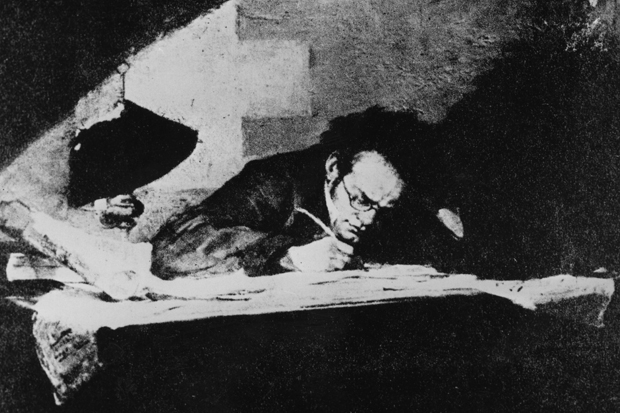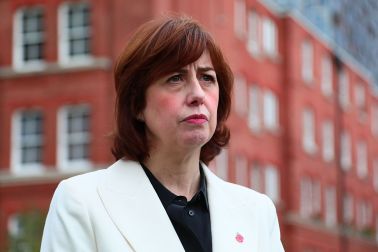On 10 October, the Sheldonian Theatre in Oxford will host the first concert in ‘the biggest ever celebration of the life and work of Franz Schubert’. Over three weeks, all 650 songs (or thereabouts) will be performed, most of them in England’s oldest concert hall, the Holywell Music Room just around the corner from the Sheldonian.
We’re promised the greatest assembly of Schubert singers in history: they include Sir Thomas Allen, Ian Bostridge, Sarah Connolly, James Gilchrist, Robert Holl, Wolfgang Holzmair, Angelika Kirchschlager, Christopher Maltman, Mark Padmore, Christoph Prégardien — plus the cream of accompanists: Julius Drake, Graham Johnson and Roger Vignoles. There will be orchestral, chamber and piano music, too, featuring the Orchestra of the Age of Enlightenment, the Doric String Quartet and Imogen Cooper, most radiant of Schubert pianists, performing the final piano sonata in B flat, D960.
There may never be another opportunity to hear all the songs in one festival. But just how much fun will that be? Schubert’s lieder, with the exception of the old favourites — ‘The Trout’, ‘Hark, Hark! The Lark’, ‘An die Musik’ — and the song cycles, are the least known of his works (apart from his operas, of which the less said the better). There are simply too many of them. Poor Schubert is in the same boat as J.S. Bach, whose stupendous choral fantasias are overlooked because people can’t be bothered to fight through the thickets of 200 church cantatas.
Knowing that the Oxford festival was coming up, I set myself the task of listening to all Schubert’s songs, of which I knew shamefully few. Luckily, I own the Hyperion complete set, in which Graham Johnson accompanies the finest singers of the 1980s and 90s. Really Johnson should have been knighted for curating this epic 18-year project. Originally he gathered the songs into themed recitals; later they reappeared in a boxed set of 40 CDs in chronological order of composition. That’s what I have.
The journey turned out to be exhausting. Despite Richard Wigmore’s sparkling translations, many of the poems are garbage. In ‘Der Liedler’ (1815), a minstrel saves a maiden from a werewolf by smashing his harp against him and then hurling him over a cliff. Even Schubert couldn’t polish this particular turd. Long, corny, cod-medieval ballads never showed him at his best. Short, commonplace love poems weren’t a problem, however. Schubert could invest the plainest lament — his poets were champion lamenters — with emotions far beyond the grasp of the writer. A lilting rhythm jumps into the pianist’s left hand; a flattened sixth creates a flicker of fear; a predictable cadence dissolves into a remote key. Earthbound verse takes flight.
Following those early songs in order is fascinating. You can tell when Schubert has been taking lessons from Salieri: he starts decorating his pieces with dainty Italianate flourishes, the musical equivalent of Betjeman’s serviettes and pastries. But he soon shrugs it off. Schubert is the most uncontrollable and perversely original of composers. In his first surviving song, ‘Lebenstraum’, written when he was about 13, the piano circles menacingly under the voice. There’s even a hint of Winterreise and the despair of Schubert’s final years — when he lived in terror of tertiary syphilis. This isn’t to say that he couldn’t be jolly: although he wasn’t an alcoholic like Beethoven, he was certainly a piss artist, writing umpteen tedious drinking songs. But his happiest inspirations are never quite what they seem. Songs that bounce along like folk dances unsettle us with chromatic twists or weird modulations.
Where Beethoven breaks moulds, Schubert plays by his own mysterious rules. The revolving motion of his first great song, ‘Gretchen am Spinnrade’, written when he was 17, leaves you wondering: ‘Where did that come from?’ As the songs progress you ask that question again and again: they demonstrate an ever-increasing mastery, but it’s mastery of a private language, almost like a child talking to itself. Yet Schubert never takes his eye off the text, whether it’s by Goethe or some amateur poet he met in a tavern.
I’ll be honest — I didn’t make it through the Hyperion set. At some point in volume 12, I compared one of its songs to the Dietrich Fischer-Dieskau version with Gerald Moore. That was a fatal mistake because — no disrespect to Mr Johnson — you can’t beat the combination of the supreme baritone and the supreme accompanist. I couldn’t switch back. Abandoning my challenge, I leapfrogged from 1815 to 1820 and luxuriated in mature Schubert. In the process I discovered one of the most thrilling pieces I’ve ever heard.
The song is called ‘Im Walde’ (‘In the Forest’), a setting of a poem by Friedrich von Schlegel that begins with the words ‘Windes Rauschen’ — the rushing of the wind. It’s essentially a philosophical statement about nature as a life-force but, as the Schubert scholar John Reed notes, the composer is more interested in its appeal to the senses: the wind, the moaning pines, the gentle springs that ‘charm sorrow from the flowers’.
Moore sets the scene with agitated broken chords in C sharp minor; Fischer-Dieskau bursts in with ‘Windes Rauschen’, rising to an A sharp — a shockingly incongruous ‘wrong note’. Having knocked us off balance, Schubert lurches teasingly from high drama to pastoral bliss. One modulation in particular is too beautiful for words. Reed speaks of ‘Promethean grandeur …the same torrent of energy which was later to flow through the “Great” C major Symphony.’ That’s nicely put, but in the song’s six-and-a-half minutes Schubert says as much as he does in the symphony’s 55.
Why did it take me until now to discover ‘Im Walde’? Sheer laziness. I wasn’t prepared to endure the mild boredom of sifting through the duds and the near-misses in order to uncover the masterpieces. More fool me. Now I must get down to some serious listening, and sharpish, because it’s just occurred to me that by the time he was my age Schubert had been dead for 21 years.







Comments